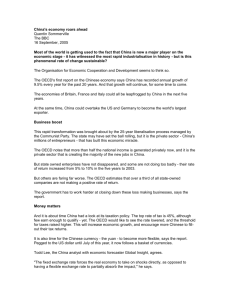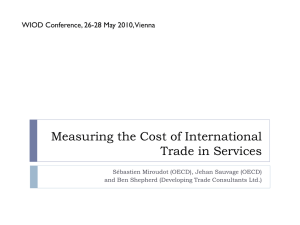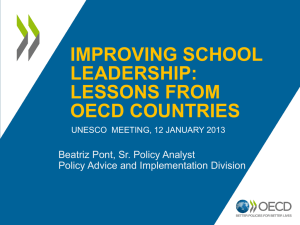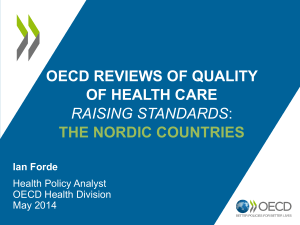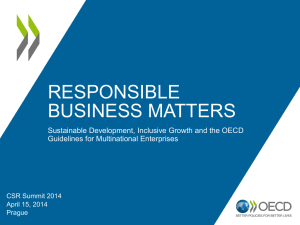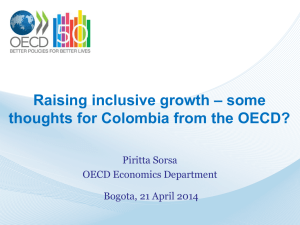OECD policy recommendation and the role of social media
advertisement
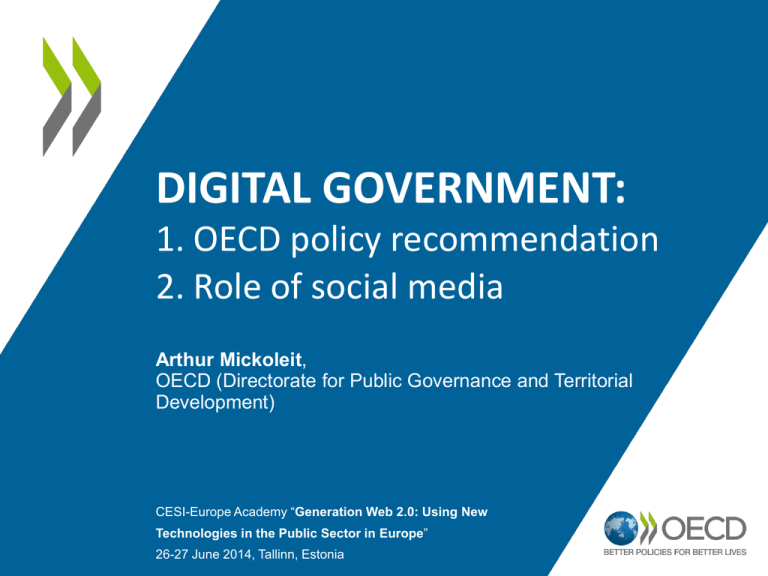
DIGITAL GOVERNMENT: 1. OECD policy recommendation 2. Role of social media Arthur Mickoleit, OECD (Directorate for Public Governance and Territorial Development) CESI-Europe Academy “Generation Web 2.0: Using New Technologies in the Public Sector in Europe” 26-27 June 2014, Tallinn, Estonia OECD Recommendation on Digital Government Strategies Engagement, openness & trust Leadership, coordination & governance Implementation, capacities and legal frameworks OECD Recommendation .. 1st pillar Engagement, openness & trust • • • • • • • Adopt open and inclusive processes Address digital divides and digital exclusion Collaboration within the public sector and with external actors Stimulate re-use of evidence, data and statistics Balance timeliness and trustworthiness of public sector data Include digital security in organisational and management thinking Manage privacy risks to raise confidence in digital government services What role for social media in opening up public sector institutions? Communications? Better left to personalities as they are more popular National government leaders National government institutions Sources: OECD data collection & Twiplomacy 2013. Based on data for government leaders and top executive institutions (office of president, office of prime minister, government office) Realise service delivery opportunities: blurring the lines between competitors and partners for public service delivery Commercial employment services Public employment services Realise trust-building opportunities: mission-critical success supported by long-term community building 14 Jan 2014: campaign 15 Jan 2014: arrest Cuerpo Nacional de Policía de España (Spanish national police force) Realise IT transformation opportunities: open source, collaborative and agile development beta.govt.nz Source: www.wired.com/wiredenterprise/2013/01/hack-the-government Beware of stereotypes (I) Not a given that social media give a voice to all, including marginalised parts of the population. 74% of Portuguese with high education level use social media, …but only 29% Source: OECD calculation based on Eurostat data for 2012. of those that have no or low education. Beware of stereotypes (II) Not a given that social media will make public matters and services appeal to young people. 80% of young Poles use social media, …but only 10% to discuss political or civic issues Source: OECD calculation based on Eurostat data for 2013; basis: 16-24 year olds. Manage the change (I) Measurement and impact assessment is necessary, but still uncommon. Source: OECD survey of government use of social media, 2013. Respondents: 25 central government institutions with responsibility for digital government strategies, e.g. CIO office. Manage the change (II) How to prepare civil servants for a social media-rich environment? Source: OECD survey of government use of social media, 2013. Respondents: 25 central government institutions with responsibility for digital government strategies, e.g. CIO office. Your feedback welcome OECD social media guidance for policy-makers on: • Objectives and expectations • Governance modes and guidelines • Legal compliance • Skills and resources • Collaboration and community-building • Managing risks • Monitoring and measuring impacts Arthur Mickoleit, OECD arthur.mickoleit@oecd.org / @OECDgov / http://oe.cd/eldrs

